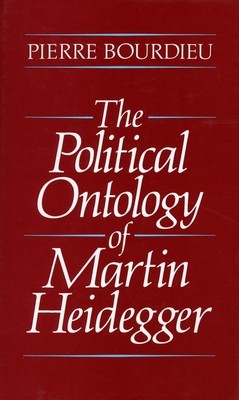
- We will send in 10–14 business days.
- Author: Pierre Bourdieu
- Publisher: Stanford University Press
- ISBN-10: 0804726906
- ISBN-13: 9780804726900
- Format: 15.4 x 22.9 x 1 cm, minkšti viršeliai
- Language: English
- SAVE -10% with code: EXTRA
Reviews
Description
Martin Heidegger's overt alliance with the Nazis and the specific relation between this alliance and his philosophical thought--the degree to which his concepts are linked to a thoroughly disreputable set of political beliefs--have been the topic of a storm of recent debate. Written ten years before this debate, this study by France's leading sociologist and cultural theorist is both a precursor of that debate and an analysis of the institutional mechanisms involved in the production of philosophical discourse.
Though Heidegger is aware of and acknowledges the legitimacy of purely philosophical issues (in his references to canonic authors, traditional problems, and respect for academic taboos), Bourdieu points out that the complexity and abstraction of Heidegger's philosophical discourse stems from its situation in the cultural field, where two social and intellectual dimensions--political thought and academic thought--intersect.
Bourdieu concludes by suggesting that Heidegger should not be considered as a Nazi ideologist, that there is no place in Heidegger's philosophical ideas for a racist conception of the human being. Rather, he sees Heidegger's thought as a structural equivalent in the field of philosophy of the conservative revolution, of which Nazism is but one manifestation.
EXTRA 10 % discount with code: EXTRA
The promotion ends in 21d.19:33:38
The discount code is valid when purchasing from 10 €. Discounts do not stack.
- Author: Pierre Bourdieu
- Publisher: Stanford University Press
- ISBN-10: 0804726906
- ISBN-13: 9780804726900
- Format: 15.4 x 22.9 x 1 cm, minkšti viršeliai
- Language: English English
Martin Heidegger's overt alliance with the Nazis and the specific relation between this alliance and his philosophical thought--the degree to which his concepts are linked to a thoroughly disreputable set of political beliefs--have been the topic of a storm of recent debate. Written ten years before this debate, this study by France's leading sociologist and cultural theorist is both a precursor of that debate and an analysis of the institutional mechanisms involved in the production of philosophical discourse.
Though Heidegger is aware of and acknowledges the legitimacy of purely philosophical issues (in his references to canonic authors, traditional problems, and respect for academic taboos), Bourdieu points out that the complexity and abstraction of Heidegger's philosophical discourse stems from its situation in the cultural field, where two social and intellectual dimensions--political thought and academic thought--intersect.
Bourdieu concludes by suggesting that Heidegger should not be considered as a Nazi ideologist, that there is no place in Heidegger's philosophical ideas for a racist conception of the human being. Rather, he sees Heidegger's thought as a structural equivalent in the field of philosophy of the conservative revolution, of which Nazism is but one manifestation.


Reviews